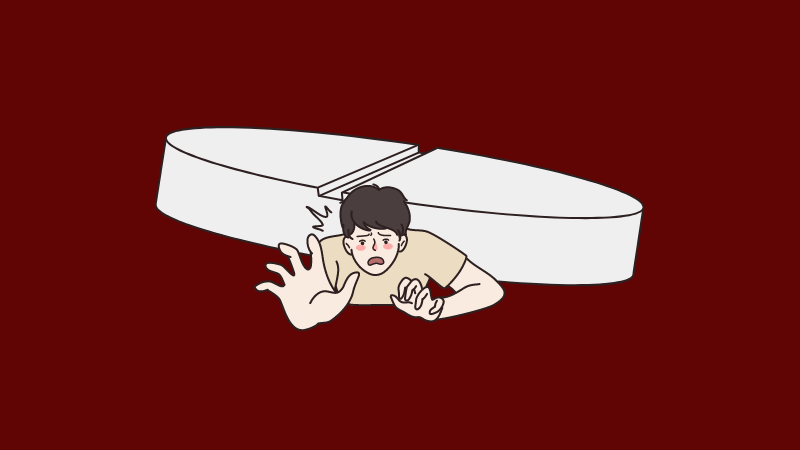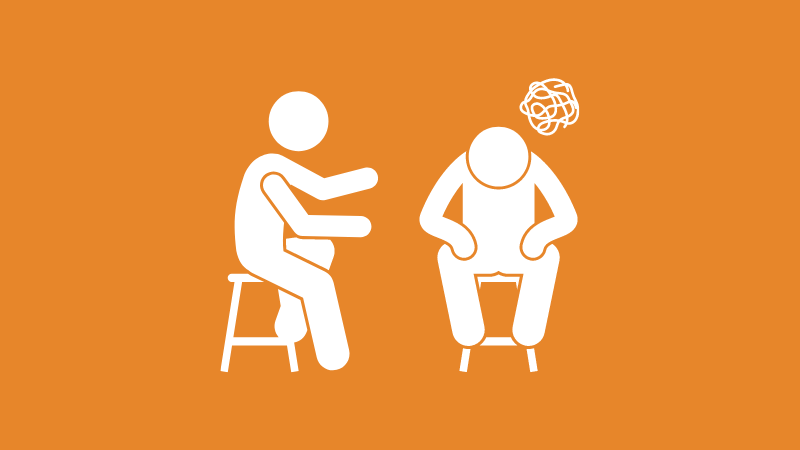Table of Contents
Affiliate link notice: As an affiliate of BetterHelp and other third-party vendors, We will receive compensation if you make a purchase using the links provided on this page. For more information, visit our disclosure page.
Last Updated on December 14, 2021 by Randy Withers, LCMHC
In the United States, depression and anxiety are the two most common mental health disorders among adults.
According to the Anxiety and Depression Association of America (ADAA), anxiety disorders affect 18.1% of adults. Furthermore, the National Institute of Mental Health (NIMH) says that 7.1% of all adults have had at least one significant depressive episode in their lifetime.
Often, these mental health disorders occur at the same time.
If anxiety and/or depression affect you, journaling is a tool that can help you cope.
While it is not a magic solution that cures all symptoms, many people with depression and anxiety find it very therapeutic. It can be done alone or combined with other forms of therapy.
Journaling is accessible, cost-effective, and doesn’t require any physical activity.
You can journal anywhere at any time.
If you’re unsure where to start, here’s a guide to journaling, including 99 journal prompts for depression and anxiety.

Benefits of Journaling
Why is journaling good for your mental health?
What makes journaling good for your mental health?
Keeping a journal is a safe space for you to release your thoughts without judgment.
Many find it easier to understand thoughts and emotions on paper rather than letting them swirl in your head.
In a journal, you can track your emotions, process things that are going on in your life, and determine patterns.
By doing this, you can problem-solve more effectively and make positive changes in your life.
Additionally, studies have demonstrated journaling:
With so many benefits, it’s worth a try!
Why is journaling therapeutic?
What about journaling makes it therapeutic?
There are several reasons why journaling has a therapeutic effect, including:
Establishing a routine:
If you suffer from anxiety and depression, many things feel like they are out of your control in your life. Journaling gives you something to look ahead to during the day.
Once you get into the habit of writing, it can give you a sense of stability in your routine.
Clearing your mind:
When you have negative thoughts whirling in your head, it can be hard to get them out unless you talk to someone or write them down.
Keeping a journal creates a private talk space for you where you can empty your mind of swirling thoughts. This process is very therapeutic.
Saying what you want to say:
It’s normal to filter yourself when you talk to other people. However, this means you can’t say everything on your mind. In a journal, you don’t have to hold yourself back.
You can write the thoughts that are in your head. They don’t need to make sense or be pretty at all.
Potential Drawbacks of Journaling
Journaling might not be the greatest fit for everyone. Not everyone enjoys writing.
Each individual is different and will find solutions that work for them.
- Perfectionists may struggle to let go and write candidly in their journals. The writing process itself might become a stressor for some individuals.
- Some may find that they get stuck in negative cycles that they can’t break during the writing process.
- Others may find that writing is more of a chore than a release.
Do what makes sense for you.
Journaling is not the only therapeutic option.
Therapy, physical activity, meditation, and grounding techniques are examples of actions that can be done with or instead of journaling.
How to Start a Mental Health Journal
How do you start a mental health journal?
There’s no right or wrong approach to journaling. However, some great places to start would be to:
Find a medium for your journaling
Journaling requires a physical place to write. Your writing medium depends on your preferences. Choose something that makes writing enjoyable and easy to do.
Some people love paper journals and find great joy in choosing a suitable design. Others find it easier to type out their thoughts on a Google Doc and keep a digital journal.
Personalize your journal
Your journal is a home for your thoughts. Personalizing your journal will make you more likely to continue using it.
Establish a writing routine
Sometimes, it can be challenging to slice out “me time” during the day. There’s no set amount of time you need to journal each day or week, but make sure that you prioritize it.
You can start simple and grow from there. Even if you can only write for a few minutes, setting aside time will ensure it will happen.
Find a tranquil space
If possible, find a tranquil space to journal. For some people, it is their room or somewhere in their house. However, if you don’t have a quiet area in your home, you can take your journal anywhere.
The important part is that you don’t have any distractions while you write.
Journaling Tips
As mentioned before, there is no right or wrong way to journal. Your journal is yours, and it doesn’t have to make sense to others.
You can craft your journal to suit your needs, interests, and goals.
No rule says once you start journaling, you can’t change your style. How you journal can evolve over time as you discover your preferences.
If you’re new to journaling, here are ideas to get you started:
1. Write often
The more you get into a writing habit, the easier it will become. In the beginning, it helps to set aside regular writing times. Even if you’re not sure what to say, write anyway.
Once it becomes a habit, your thoughts will flow more freely, and it will feel natural.
2. Don’t worry about errors
When we write for school or work, we must write without errors. In journaling, it is crucial to let go of that mentality. There is no need to have perfect writing in your entries.
Expressing yourself and releasing your emotions into the pages is far more critical than the text’s quality.
3. Incorporate other forms of journaling
While journaling, you don’t need to write in paragraph form. You don’t even need to write at all! You can make lists, copy poems or songs, draw, write letters, create stories, and use prompts (check out the 99 we came up with below).
You can keep it simple or get creative!
4. Write in a stream of consciousness
Stream of consciousness writing is a continuous flow of thoughts and reactions. If you don’t know what to write, scribble down what comes to mind at that very moment.
What do you feel? What is happening around you? What thoughts are popping into your head at this very moment?
5. Express what is bothering you
If there is something on your mind, express it in your journal. By writing out what is bothering you, it is possible to get to the issue’s root. Even if you don’t know why it’s bothering you or how to fix it, write it anyway. You can always return to it later.
6. Use unfiltered writing
Few things are more therapeutic than being able to say what you want to say. In your journal, you don’t need to mince any of your words.
You can curse, you can vent, and you can write your most profound emotions without having to filter anything. It is a brave space to express yourself without fear.
7. Track your moods and identify triggers
A substantial benefit of journaling is that it serves as a written record of your thoughts and emotions. You can track your mood throughout time and identify what triggered it. Ideas of things to log in your journal include stress levels, significant events, interactions, eating habits, sleep schedule, and more.
8. Document symptoms
This idea is similar to tracking your moods and identifying triggers but focuses more on symptoms of depression and anxiety. On days when your symptoms flare up more, you can note them in your journal.
Combining this with mood and trigger tracking can help you identify patterns and create solutions.
9. Write positive affirmations about yourself
Writing positive statements about yourself in your journal is a great way to combat the negative emotions swirling around in your head. Seeing them written down makes them more tangible.
You can write positive things about yourself to save for when you don’t feel great.
10. Reflect on your entries
The beautiful thing about journaling is that it’s an archive for your mental health journey. It helps to look back on everything that you have written and reflect on significant events, thoughts, and changes in your life.
Reviewing past entries can help you understand things going on in the present.
99 Journal Prompts for Depression and Anxiety
Journal prompts for depression and anxiety can guide you through your emotions and help you work through issues. The 99 prompts below include topics designed to boost your mood, improve your self-esteem, and find solutions to things that are bothering you.
- What are five things you can do this week to improve your mental health?
- List your 15 best qualities.
- List 10 things you are grateful for.
- Do you believe in miracles? Why or why not?
- What do you think about the following statement: “depression is anger turned inward.”
- List 5 things that trigger your anxiety. Why do you think they do that?
- Write your best friend a thank you letter. How have they earned the title of “best friend”?
- Describe your greatest achievement and why it means so much to you.
- Regardless of how terrible my day is, these ten things can always make me feel better:
- List 5 things that scare you and why.
- List 5 negative things you think about yourself and why they are not true.
- Write an open letter to your anxiety. What would you say to it?
- If you had to give your depression a human name, what name would you give it and why?
- Describe your relationship with money? Do you think it helps or hurts your anxiety?
- List 5 things about your living space that you can change to promote your mental health.
- What would you like most people to know about you and why?
- What was your most embarrassing moment, and why?
- If you could change something about yourself, what would it be and why?
- Write about your happiest childhood memory.
- Where do you feel the most safe? Why?
- Explain to your 12-year-old self how talking about your depression helps.
- What would your life be like if you didn’t have (depression, anxiety, etc)?
- What is a quality that you admire most about others? In what way do you see this quality in yourself?
- Name 5 things you can do for self-care that you are not already doing
- What is your worst habit? How would your life improve if you changed it?
- What are your 5 best talents?
- What is unique about you? Do you keep it hidden or let others see it? Why?
- What is your favorite song lyric? Why?
- If you could achieve anything in your life, what would it be?
- Describe your ideal friend.
- Talk about physical pain and what effect, if any, it has on your mood.
- What negative messages did you receive growing up that still affect you to this day?
- What is your relationship with food? Is it healthy or harmful?
- When you look in the mirror, what is the most beautiful thing you see and why?
- Talk about the benefits of journaling and why you would benefit from adding it to your daily routine.
- What are 3 benefits of stretching?
- Make a list of 10 quotes that inspire you.
- Write a letter to your favorite teacher and describe how they affected your life
- Write a letter to someone you dislike and forgive them
- List 5 ways therapy would be beneficial to you.
- List 5 things that give you anxiety and explain why they bother you.
- Write a letter to your parents and tell them 5 things they don’t know about you (but don’t send it).
- What does your best day look like? How could you have more of these?
- What is something difficult that you were able to overcome?
- Write a letter to your 10-year-old self. How would you encourage them?
- Make a schedule for your perfect day. Assume you have 500 dollars to spend.
- How would you describe yourself to a stranger?
- What does spirituality mean to you, and what does it look like in your life?
- If you could volunteer anywhere, where would you volunteer and why?
- List 5 benefits of helping others.
- Give three examples from your own life when you went out of your way to help others.
- Give three examples from your own life when someone went out of their way to help you.
- Who was your favorite teacher? Why?
- Who was your favorite boss? Why?
- Write a letter to your future self.
- Make 2 columns. In the 1st column, write down 5 things you fear and in the 2nd column, explain why those fears are valid.
- Talk about a time you mistook a feeling for a fact. How did it affect you?
- If you knew you would not fail, list 5 things you would do?
- If your depression was an animal, what animal would it be and why?
- What are your thoughts about the following statement: “anxiety stems from our desire to control things that we cannot.”
- If your anxiety was a fictional character, what character would it be and why?
- If you could have the same dream every night, what would you dream about and why?
- Who is your favorite fictional character and why?
- What advice would you give to your child about how to manage their anxiety?
- How would your life be better if you did not suffer from depression or anxiety?
- List 5 ways anxiety is actually beneficial to people.
- List 15 things you value about yourself, other people, or work/school.
- List 5 reasons why it’s important to protect your emotional well-being.
- Write a letter to your doctor in which you describe your symptoms and ask for his/her assistance.
- Write a letter to your therapist in which you describe 5 things about yourself that you want them to know.
- Do you prefer dogs or cats? Why?
- List 10 ways pets make your life more whole.
- If you could study any subject in college, what would it be and why?
- If you could develop one new skill overnight, what would it be and why?
- Write a letter to a childhood bully and forgive them for what they did to you (but don’t send it).
- Write a letter to your teenage self telling him/her 10 things you wish he/she knew.
- Develop a bucket list of 5 things you’d like to accomplish over the next year.
- What is the biggest life lesson you’ve learned to date? How did you learn it and how has it affected your life?
- Which emotion is most difficult for you to experience. Why?
- Discuss 5 things you did well this week.
- What do you wish your friends would say to you when you’re feeling down?
- What would it feel like to forgive yourself?
- What is your favorite hobby and why?
- List 5 ways exercise could help you with your depression/anxiety
- Describe your bedtime routine. Is it helpful or harmful for your sleep?
- What was your greatest failure and what did you learn from it?
- Write about a difficult time in your life that you have overcome.
- Describe how you want your life to look in 5 years.
- What are the three things that most scare you and why?
- What was the most beautiful compliment you ever received?
- What 15 things make you smile?
- Write about one thing that you look forward to every day.
- What are your 5 favorite things to do when it’s raining?
- What hobbies or interests did you have as a child that you still have now?
- What advice would you give to your best friend about how to manage depression?
- What’s the first thing you think about every morning upon awakening, and what’s the last thing that crosses your mind before you fall asleep?
- Write a letter to the person who causes you the most anxiety. Tell them why they cause you anxiety, but don’t send it to them.
- What does your dream life look like?
- Imagine a miracle happened and you woke up one day with a new life, what would be different? What would stay the same? What are you unsure about?
Final Thoughts
Depression and anxiety can affect anyone. With the right self-help tools, you can soothe the adverse effects of these mental health conditions.
Journaling is an excellent means of releasing the thoughts circling around in your head. There is no one to judge you when you write your thoughts down on paper.
You can combine journaling with other support systems or use it on its own.
It is a profoundly personal experience with no incorrect way to approach it.
Find a suitable journaling medium, set aside some time to write, locate a relaxing writing place, pick a prompt, and you’ll be on your way!
Click here to download your free .pdf copy of 99 journal prompts for depression and anxiety!
References
- Anxiety and Depression Association of America Facts & Statistics
- NIMH » Major Depression
- CHANGES IN CIRCULATING LYMPHOCYTE NUMBERS FOLLOWING EMOTIONAL DISCLOSURE: EVIDENCE OF BUFFERING?
- Emotional and physical health benefits of expressive writing | Advances in Psychiatric Treatment | Cambridge Core
- Online Positive Affect Journaling in the Improvement of Mental Distress and Well-Being in General Medical Patients With Elevated Anxiety Symptoms: A Preliminary Randomized Controlled Trial









You see loved ones and friends going through rough times. But sometimes, you witness them experience a mental health problem or crisis.
And yet, shockingly, we don’t know the signs of poor mental health or how to respond to a mental health emergency.
In preparation for those times, you must learn how to provide mental health first aid until they receive appropriate professional treatment or resolve the situation.
Depression and anxiety attack anyone but with the right self-help tool, it can cure accurately.
Thanks so much for this, and for the PDF! I’ve found journaling to be a powerful ally in my quest for mental health and am SUPER excited to add these prompts to the list I’m collecting! ❤️
You are quite welcome!